Memoirs & Diaries - Varieties of Trench Life
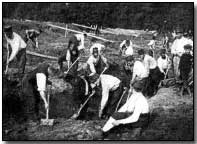 August 4th, 1914, in a
little country bank: "Broad's gone with the Terriers: you'll have to take
charge." It was 1915 before
wire-pulling brought a strange, lame man to the office. "I've come to
let you get away," he said.
August 4th, 1914, in a
little country bank: "Broad's gone with the Terriers: you'll have to take
charge." It was 1915 before
wire-pulling brought a strange, lame man to the office. "I've come to
let you get away," he said.
"To let me go?"
It was as if a spring that had been wound up and up all these months was suddenly released. That made the bump against a brick wall all the more dumbfounding. To be rejected by the doctor, turned down as physically unfit after all manner of sports and specializing in gymnasium work - it was staggering. But there was no doubt: "danger of rupture: operation and a month's rest."
The day did come at last to be sworn in. It wasn't quite so thrilling as I'd expected because the last words before the Bible was passed round were words of advice from the captain:
"I should advise some of you - I mention it now because after you have sworn I shall have to order, not advise - to get your hair cut rather more a la military; at present some of you have it decidedly not a la military."
Still, we were soldiers, even if we weren't soldierly enough in forming fours to please the corporal. And we took his word that it wasn't any use thinking we were soldiers until we could jump to it better. No one argued that we shouldn't be fighting the Germans from the formation of "At the halt facing left, form close column of ---platoons!"
It wasn't until months later, after a tenth successive two hour wait on the same patch of snowy bog-holes for an attack that never came, that the frozen silence of dismissal was broken by Johnson's acid comment - he was a schoolmaster from the north, so his critical faculty was not quite tame:
"I may be obtuse, but I really can not see what earthly good anyone has got out of this night's battalion training" - and oh! the world of scorn in that word "training." "Learning to follow each other about in the dark? I'm afraid, Dickie, if you can think of that, you've got the making of a better i soldier in you than I have."
But there was still enthusiasm, even though only of the sticking-it order: we wouldn't let it be damped quite out: keenness enough to bring stripes and their load of care, stripes that evoked cynical ribaldry from pals, hostility from the fed-up and the jealous, and that lynx-like antagonistic vigilance that noncom. and private mutually felt.
And then a commission and a new world to conquer. One would be able to do so much more.
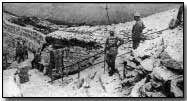 Could one, though?
When we asked about the men: "Are they old soldiers? Do they need much
training?" and got the answer: "Training? They've been getting all the
training they want this last year and more," it became apparent that
fed-upness was not confined to the ranks.
Could one, though?
When we asked about the men: "Are they old soldiers? Do they need much
training?" and got the answer: "Training? They've been getting all the
training they want this last year and more," it became apparent that
fed-upness was not confined to the ranks.
It wasn't to be wondered at, really: a few Zep scares, a few entrainment orders that turned out to be only practice, did make us wonder whether the duration of the War was to be spent in English billets. Then, Easter 1916, at 2 a.m. came another entrainment order.
Half the battalion didn't believe it: many a one had no razor in his kit when the next chance to shave came. For the trains that we really did entrain into sped off not south-westward for the Plain or France, but away and away up the "North Western," and it wasn't until they disgorged us on Liverpool Docks that rumours could be swopped about "Sinn Fein gentry - broken bottles and shillelaghs."
It was a baptism of fire all right, with flintlocks, shotguns, and elephant rifles, as well as more orthodox weapons. And 100 casualties in two days' street fighting was a horrible loss to one battalion: the more so since my one friend from the ranks, commissioned same day, was shot through the head leading a rush on a fortified comer house; first day on active service, and it was my job to write and tell his mother, who thought him still safe in England.
A hateful task: so was another duty of one misty dawn soon after, when four young officers had to command four firing parties, and four rebel leaders stood in turn blindfold against a wall.
After that, more training - a repetition of the training so wearisome in England, till the Irish winter made even trench-digging impossible; but we could always have "Lecture by Company Officers on March Discipline."
We did get to France at last, though; and into the trenches, too. The memory of that is mainly-mud. There was the ominous donning of " um-boots, thigh"; the shell holes and slithery duckboards (dear old Johnson and his "following each other about in the dark"); the front line, where, by constant baling, liquid slime could just be kept from lipping over the dug-out door-sills.
And there in that nightmare of mud and wire, by the deathly light of occasional star-shells from over the way, we learned the landmarks to guide us : "Left by the coil of wire, right by French legs."
"French legs?" "Yes, we took over from the French; the legs of one they buried in the side of the trench stick out a bit, you can't miss it." It was rather startling, but didn't seem to merit a second thought.
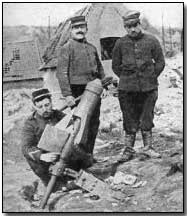 Sniping, shelling, and the
Sisyphean labour of trench maintenance were endured until relief, and even
that was nightmare, too.
Sniping, shelling, and the
Sisyphean labour of trench maintenance were endured until relief, and even
that was nightmare, too.
Climbing out of the river of sludge called "C.T." we trudged along the top, caring for nothing but those wicked ankle-high strands of wire across the track - oh! the concentrated loathing in that warning growl of "Woy-er" from each man to his follower. And so we bundled on until the guide - poor lad, he'd only been up once before - confessed he'd lost his way, for the duckboard track we'd struck led up to the line again, to the sector on our right.
Despair? There was pale grey dawn behind us by the time compass bearings, verified by a periodic "ploomp ah" from one of our own kindly howitzers, led to the double line of shattered tree stumps along the great straight Amiens road; and we held off utter exhaustion until dug-outs, black, boiling tea, and sleeping like logs, ended the first turn in the line.
Then suddenly, those trenches were abandoned: on we pushed for the Hindenburg Line. But though company after company was flung on a mass of wire with machine guns sweeping its face, the Hindenburg Line was proof against little local attacks like these: mortifying thought after hell let loose with rifle and machine gun, artillery and trench mortar, that the pandemonium whose only visible result was those corpses on the wire - men we had never known till a year ago and since then had known as brothers - was nothing but a demonstration to pin the enemy down, unworthy even of mention in the report of activity on the Western Front.
Still, we saw a real big push later on. How many trucks from those mazes of sidings at St. Pol and Hazebrouck are needed to move a battalion? How many trains to move a division? And how many divisions poured into that never-ending assault - a division a day, we heard - beyond the Menin Gate, a one-way road for thousands in the British Army?
Fancy going on leave from the Ypres Salient to England! It seemed unreal all the way; at Poperinghe rail-head, at Boulogne rest camp. Even when Grisnez at last faded into the sea and Folkestone rose nearer, one could hardly believe it - until the barrier at Victoria. It must have been in a different world.
Lifted out of the mud of the Salient to derelict seaside villas; taking up a new lot of men to a section of front made up of town, canal, and dyke-edged polder, with a foot of water rippling around the earth-works; fetid fluid in the dykes around the ruined town; inky-black, icy river swishing under flimsy duckboard bridges: no wonder that trench-foot sent more men down the line than wounds.
Add the ever-present shelling of the town that brought tottering brickwork crashing down on us; add the machine-gunning of the straight right-angled streets; add dysentery; add utter exhaustion from hurrying in sodden, heavy clothing around those slimy tenacious " boyaus," and realize that relief from the Nieuport sector, wherever it might mean we were going, seemed a blessed release from purgatory.
A ten-mile canal voyage and three days' march on good roads through inhabited country might have been a glorious rest cure, but for feet rendered soft and agonizing by standing and sleeping in sopping boots and socks.
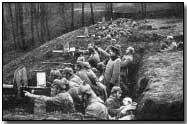 Down among the tunnels and
brick-stacks of La Bassee, trench mortars on both sides rained down their
12lb., 50 lb., 112 lb. of high explosive: and such lumps of death as that
can't be thrown about without the casualty returns growing sadly. It
was all in the day's work, but none the less it meant the loss of pals, when
one after another went west through a direct hit, or a premature burst, or
an unlucky shell clean into the ammunition store.
Down among the tunnels and
brick-stacks of La Bassee, trench mortars on both sides rained down their
12lb., 50 lb., 112 lb. of high explosive: and such lumps of death as that
can't be thrown about without the casualty returns growing sadly. It
was all in the day's work, but none the less it meant the loss of pals, when
one after another went west through a direct hit, or a premature burst, or
an unlucky shell clean into the ammunition store.
So all the spring of 1918, ever feebler reinforcements came, slim boys and weary crippled men; and ever rumours grew of the great push coming.
It was a certain satisfaction to the wiring parties of those nights - every available man - that this sector was one of the few points invulnerable to the German rush of March 21st: So that Collishan, the little cook's mate who had been a Manchester coster and showed a magic skill in coaxing barbed wire around those terrible screw-pickets, had accomplished something before the machine gun got him down south.
Down south again - oh, the pitiful irony of it - on that same old battlefield where the Somme advance had started nearly two years before; and after all that measureless slaughter men were to fight again over that same blood-soaked ground.
And the weary, wearing hopelessness of it joined with the fearful intensity of the shelling to make this such a culmination as even previous experience had never made us dream of.
Shelled continuously through the night; dashing out to tie up and replace the sentry hit by shrapnel; floundering with the dead weight of a wounded man along the collapsing makeshift trench, and then back again, lurking in a flimsy brick cellar that shook with every blast. And in the morning the rims of five great shell holes around the dome of our tiny shelter.
Blazing away with the dawn at massed attacks in full view. One gun blown up; dragging back the other to reserve positions, while every pair of men who could walk, or stagger, loaded up with boxes of ammunition, and tramped up the open road with that frightful barrage spouting up cascades of earth on right and left. What was in everybody's mind?
What was in the mind of old Private Jim Black, a road labourer by trade, when the man carrying with him got a splinter in the leg, and Black tied him up and then humped the 2-cwt. box on his own rheumaticky shoulder and trudged on?
So it went on for days, with "wounded" and "killed" appearing against name after name. It never crossed my mind to wonder whether I'd ever get hit - too busy to think of such a thing, and that is a literal fact.
That was why it was such a surprise. Up the long valley north of Gommecourt, where bits of line changed hands every few hours, I tramped choosing gun positions: passed a rough trench cutting across the track, and reconnoitred the shoulder of the hill. "Smack!" "Smack!" at intervals went the sound of bullets at medium range. But one had grown to disregard them: till it struck me, "They're sniping from across the valley: they've pushed us off that nearest ridge; and I'm in No Man's Land."
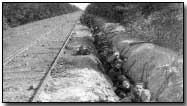 That moment he got me: a
terrific "Bung-g-g" on the jaw, and down in the ditch by the track I spun,
face and neck streaming blood. Field dressing was pulled out in a
moment, but it was no place to stay: back to that trench I must creep,
dragging flat along the ditch. Too slow, though; bleeding at that rate
I'd never cover 200 yards: up on all fours and crawl. But then
"Smack-k!" came the vicious spit again: was I to crawl and be potted at?
That moment he got me: a
terrific "Bung-g-g" on the jaw, and down in the ditch by the track I spun,
face and neck streaming blood. Field dressing was pulled out in a
moment, but it was no place to stay: back to that trench I must creep,
dragging flat along the ditch. Too slow, though; bleeding at that rate
I'd never cover 200 yards: up on all fours and crawl. But then
"Smack-k!" came the vicious spit again: was I to crawl and be potted at?
Up and run for it; and "Smack-k-k!" came again as I tottered forward, half the field dressing in its waterproof cover still clenched in each hand. One hundred and fifty yards to go: "Smack-k-k!" again before half-way, and a spurt of earth just behind. How long - how long, to get into that trench? And how long does it take to reload and fire? I know that perfectly well, and I see time for one more shot before I can reach it. Slacken speed, to make a final effort, and "Smack-k-k!" into the ditch a yard ahead.
"Ah! Safe!" and I tumble into that trench on top of a knot of mud-caked Fusiliers.
"My Gawd! Field dressin', sir?" and the two bits are ripped open and clapped on, and the word goes along for stretcher bearers.
Memories after that? A kindly efficient American M.O. bandaging cases by the dozen. Then another figure emerged out of the mist: the dearest old silver-haired padre, who didn't waste any silly words, but brought a luscious sponge and hot water, and tenderly bathed face and forehead clear of mud and blood.
Then they took my boots off: that meant rest for a while, anyway. And when the ambulance pulled in to a chateau marked "C.C.S.," I heard the voice of an English nurse; and at the sound there came a most wonderful feeling that now everything would be perfectly all right: there was no need to worry any more.
Hospital in Rouen, where at length the M.O. took down the card from my bed, and at that mystic sign the next man - oldest inhabitant of the ward, he had seen dozens pass through while his leg refused to mend, but still he enjoyed their good luck - turned to me and whispered, "Blighty, Dickie."
Captain A. A. Dickson, Inns of Court O.T.C., September to December 1915. Commissioned to Sherwood Foresters. Dublin Rebellion. France, January 1917: Somme, Ypres, Nieuport. Commanding trench mortar battery. Wounded, November 1917; again in April 1918, during German attack. Hospital until September 1918. Demobilized unfit, January 1919.
First published in Everyman at War (1930), edited by C. B. Purdom.
Photographs courtesy of Photos of the Great War website.
In WW1 an "ace" was a pilot who scored five confirmed "kills".
- Did you know?
